2021 Awards Winners
The KiwiNet Awards celebrate heroes in research commercialisation — those individuals and organisations whose best practice approach is changing the innovation landscape in New Zealand. We congratulate the 2021 winners!
Commercial Icon Award
This is KiwiNet’s highest honour given to a quintessential champion of New Zealand’s research commercialisation community. This individual has a high level of aspiration for research commercialisation as a catalyst to deliver prosperity for all. This is demonstrated by their unwavering commitment to substantially advancing the cause and activity of commercialisation of publicly funded research within New Zealand. Their body of work has made an outstanding impact on the research commercialisation ecosystem.
Inaugural Winner: David Hughes, CEO, Plant & Food Research
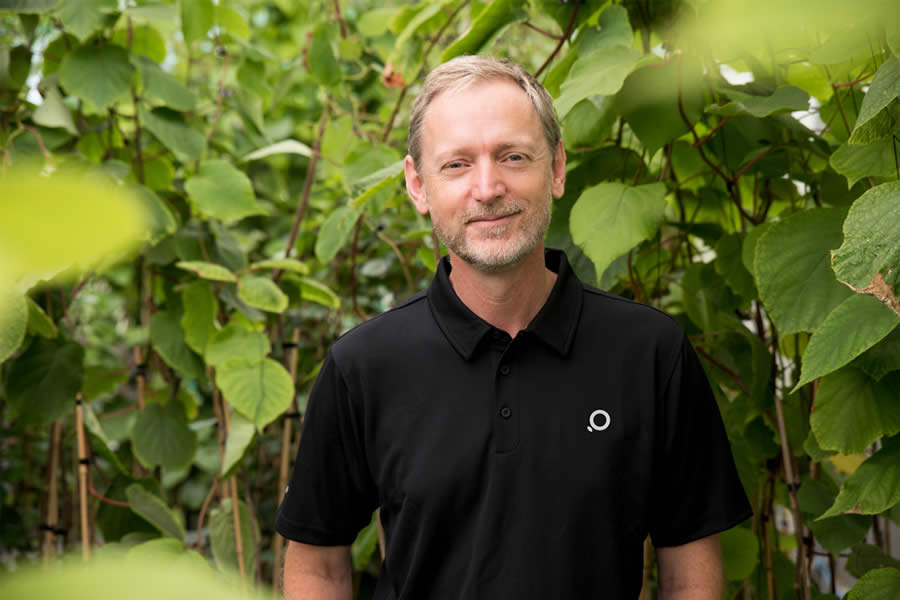
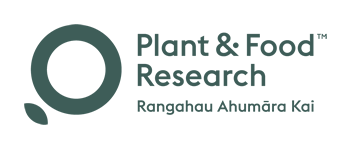
David Hughes has had significant impact on research commercialisation for Plant & Food Research and for New Zealand. His visionary leadership and calm, considered communication style provide wisdom and inspiration. When he started as Group General Manager Commercial in 2009, Plant & Food Research had a royalty stream of $13M pa from kiwifruit and apples. David had a dream to build Plant & Food Research’s commercialisation capacity and decrease the reliance on government funding.
Through championing his vision, he inspired the necessary culture change to increase the commercialisation of research and diversify the royalty stream to provide security and growth for the organisation. Plant & Food Research now receives a royalty stream from a much wider array of crops, technologies, and new commercialisation models – such as the Pacific Berries joint venture for raspberry commercialisation in the northwest USA. Royalties grew to $52M in 2020 and now make up 30% of Plant & Food Research’s annual revenue.
In 2018, David won over the Plant & Food Research Board with his vision and was appointed CEO. In this role, David initiated a change in company strategy to focus more on research commercialisation. He established a new business model to re-invest Plant & Food Research royalties in Technology Development, specifically aimed at developing science for commercialisation. David is recognised for being a strong advocate and supporter of research commercialisation in New Zealand. He has sat as Director on the board of multiple early stage companies and commercialisation ventures, as well as on the Board of KiwiNet for 8 years.
Breakthrough Innovator Award
This award recognises an upcoming entrepreneurial researcher who is making outstanding contributions to business innovation or is creating innovative businesses in New Zealand through technology licencing, start-up creation or by providing expertise to support business innovation.
Winner: Dr Shalini Divya - TasmanIon/ Wellington UniVentures
A new aluminium-ion battery technology, offering a safer, sustainable, cost-effective alternative for grid storage and portable applications
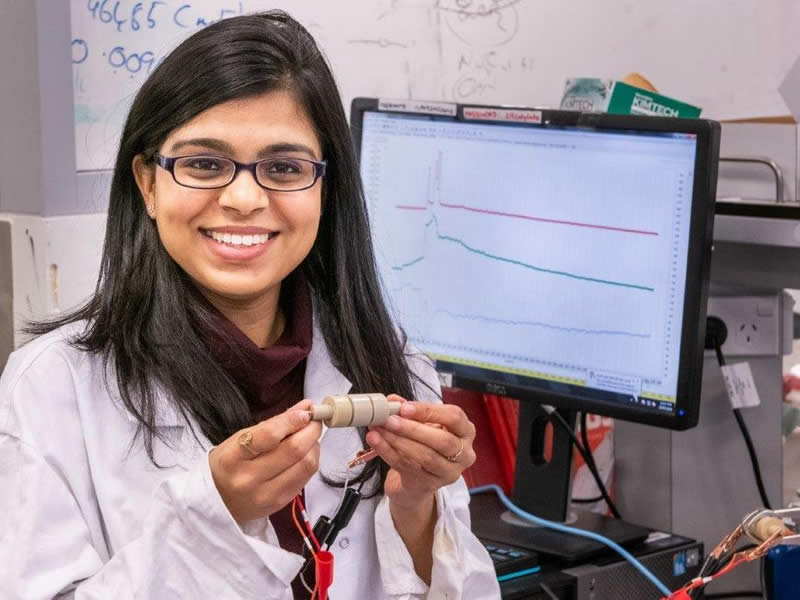
Shalini Divya, Co-Founder and Chief Technology Officer, TasmanIon
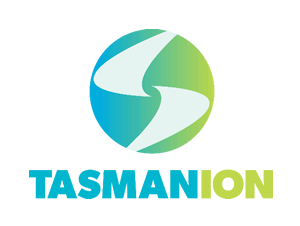


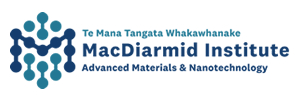
Born and raised in India, the fourth-largest energy consumer globally, Dr Shalini Divya’s work into more sustainable battery technology stemmed from her energy poverty awareness. Energy poverty affects more than 400 million people, and limits access to food and water, education and employment and negatively impacts health and hygiene.
Shalini completed her BSc (Hons) in Chemistry from University of Delhi before completing her MSc in Chemistry at Birla Institute of Technology in Mesra. In February 2017, Shalini received the Victoria University of Wellington Doctoral Scholarship and started her PhD with Professor Thomas Nann, previous Director of the MacDiarmid Institute for Advanced Materials and Nanotechnology.
Shalini's research breakthrough came when researching more sustainable battery technology for her PhD. She discovered a new cathode material for aluminium-ion batteries that outperforms most other energy storage materials in aluminium-ion battery literature. Aluminium-ion batteries use electrolytes that are non-flammable and therefore suited to a range of applications. In addition, aluminium is the most abundant metal in the Earth's crust, non-toxic, and easily recyclable.
With a growing demand for more sustainable technologies that increase storage supply and reduce our carbon footprint - the commercial potential of Shalini's discoveries was clear. Shalini worked closely with Wellington UniVentures and the MacDiarmid Institute to drive the project to the investor level, progressing the establishment of a new spin-out company, TasmanIon. Shalini has also secured a place on KiwiNet's Emerging Innovator Programme to enhance her entrepreneurial skills and connections and advance the commercialisation of her new technology.
While aluminium-ion battery technologies are still in their infancy, Shalini is determined to create an entirely new battery class that does not rely on lithium - used for battery technology in electric vehicles (EV's), renewables and other applications. With supply constraints on lithium in the long term, TasmanIon has the impetus to compete against the cutting-edge incumbent and integrate into large markets already established, allowing for rapid growth. Aluminium-ion batteries can also be produced much cheaper than Lithium-ion batteries, with a more competitive and less volatile metal price. Shalini has also demonstrated that aluminium-ion batteries can be manufactured in existing production facilities; therefore, avoiding significant investments into new production technologies.
Researcher Entrepreneur Award
This award recognises an entrepreneurial researcher who has made outstanding contributions to business innovation or has created innovative businesses in New Zealand through technology licencing, start-up creation or by providing expertise to support business innovation.
Winner: Professor Johan Potgieter - Massey University
Inspiring entrepreneurial insurgency by creating a technology pipeline
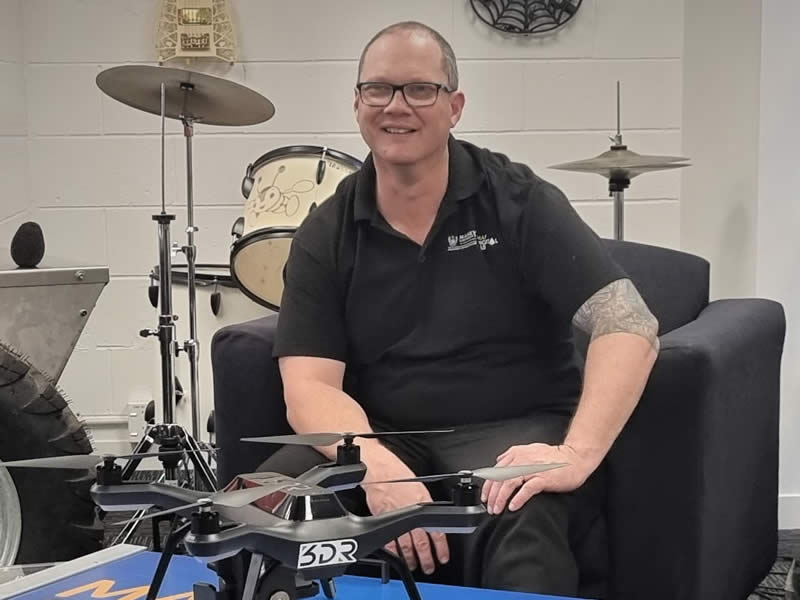
Professor Johan Potgieter, Massey AgriFood Digital Lab, Massey University
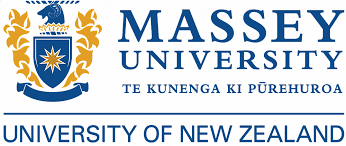
Professor Johan Potgieter is at the centre of almost everything at Massey AgriFood Digital Lab. Johan has created a hub for some of the most outstanding innovation, robotics, IOT (Internet of Things) and 3D printing in the Southern hemisphere. You can find him guiding and advising students, staff, directing projects, and sharing his knowledge with the aspiring innovators of the future.
Prof. Johan Potgieter has developed a significant commercialisation portfolio with a strong drive to improve the New Zealand research and commercialisation landscape through strong business partnerships and end-users:
- Remote monitoring substation robotic platform for Transpower Ltd
- Within the New Zealand Product Accelerator engaging with and providing commercial technology solutions to a variety of companies within New Zealand
- FMCG product development for Zuru Ltd
- Developed a confectionary manufacturing process for a $500M revenue product
- Start-ups - MA Innovations Ltd, ISM Ventures Pty Ltd, Compress Tech Ltd
Prof Johan Potgieter has a well-established reputation for his work in educational robotics and have been inducted into the World Robotics Education and Competition (REC) Foundation Hall of Fame. Johan is being sought out by large companies that are looking to implement technology into their processes and framework.
Commercialisation Professional Award
This award recognises a commercialisation professional working within a New Zealand research organisation who has made an outstanding contribution to the commercialisation of publicly-funded research.
Winner: Darja Pavlovic-Nelson - Plant & Food Research
Sensing opportunities – capturing value from Plant & Food Research IP
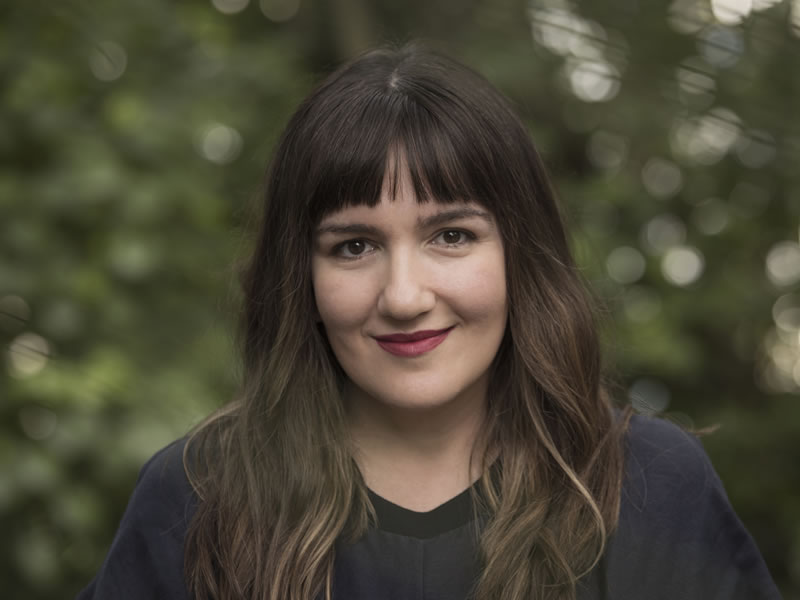
Darja Pavlovic-Nelson, Commercialisation Manager, Plant & Food Research

Darja Pavlovic-Nelson has been a commercialisation manager for less than two years and has already achieved a successful $1M capital raise to spin out Scentian Bio, securing the deal within just 15 months. Darja's passion, tenacity and excellent commercial acumen provide a great foundation for her future as an outstanding commercialisation professional.
Darja demonstrated excellent commercial acumen from the time she started in an IP role at Plant & Food Research, and worked closely with science teams and business managers to guide and coach them in developing IP strategies and in pulling together commercialisation plans. Working as an IP advisor, Darja supported a number of projects through to commercialisation.
She started providing business support to the science team behind Scentian Bio as a 'stretch' development project. Darja's entrepreneurial approach soon led to her being promoted to a commercialisation manager role taking a leadership role in the development of the Scentian Bio strategy.
Scentian Bio's technology is a platform that uses insect odorant receptors to provide rapid and ultrasensitive detection of target volatile organic compounds. It will provide novel chemical sensors with broad application across multiple markets (e.g. food safety/quality, explosive detection, cancer diagnostics, hazardous chemical monitoring, biosecurity, water quality, and alcoholic beverage production) with the global opportunity estimated to be worth more than $1B.
Capital raising is a new commercial activity for Plant & Food Research so Darja had to rapidly upskill herself through engaging with the investment community. She developed the business model and documentation, and conducted all the negotiations that led to acceptance of the deal by the Plant & Food Research Board, investors and of course the science team.
Commercial Impact Award
This award celebrates excellence in research commercialisation delivering outstanding innovation performance and the potential for generating significant economic impact for New Zealand.
Winner: Aureo®Gold - Plant & Food Research, Zespri and UPL
Aureo®Gold a new biocontrol product combating plant disease
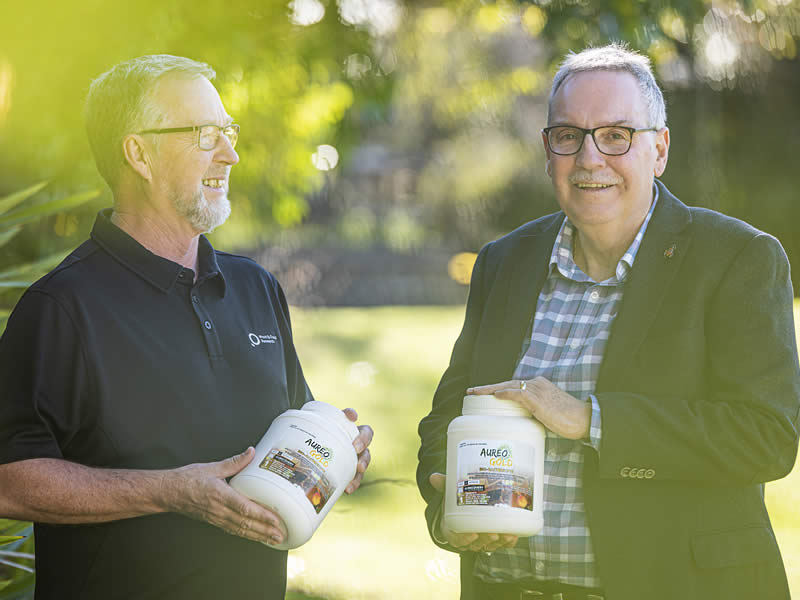
Greg Pringle, Business Development Manager, Plant & Food Research (left) and George Follas, Product Development & Regulatory Lead Australia & NZ, UPL

Aureo®Gold is a new biocontrol product, developed by Plant & Food Research and its commercial partner UPL, with the support of Zespri and Kiwifruit Vine Health (KVH).
Its launch by UPL in late November 2018 marked an important milestone in the New Zealand kiwifruit industry's ongoing efforts to better manage the kiwifruit disease Pseudomonas syringae pv. actinidiae ('Psa').
A more environmentally friendly product that is safe for bees, Aureo®Gold meets low residue requirements for export kiwifruit. It is already providing kiwifruit growers in New Zealand, especially organic growers, with an important tool in their Psa management toolbox and demand for the product has been consistently high since launch.
Plant & Food Research and UPL have begun commercialisation offshore to meet the demands of kiwifruit growers globally, where kiwifruit is grown on more than 400,000 hectares, most of which are affected by the Psa disease.
UPL is now exploring expanding Aureo®Gold to other territories and for other disease targets through complementary trials in several countries, with a commitment to register the product accordingly.

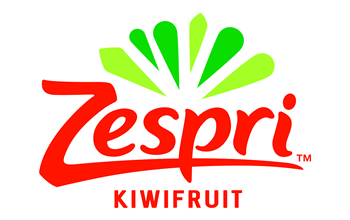
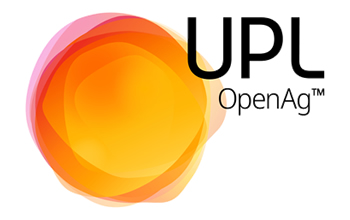

Momentum Student Entrepreneur Award
The award recognises highly motivated New Zealand university students who have made significant progress developing an idea that can change the world.
These students are making outstanding contributions to commercialisation and innovation or has created an innovative business in New Zealand through technology licensing, start-up creation or by providing expertise to support innovation.
Winner: Luke Campbell, University of Canterbury
Millions of calls made smarter with Vxt

Luke Campbell, co-founder & CEO Vxt



Luke Campbell, co-founder and CEO of call and voicemail platform Vxt, is studying toward a bachelor degree in Physics and Economics at the University of Canterbury. Luke started the business with co-founder and long-time partner computer scientist Lucy Turner in November 2018. Since launching the company, Luke and the now 17-strong Vxt team has rapidly grown the Vxt business. Luke also dedicates time to encouraging other students to launch their ventures and assists with start-up challenges and hackathons.
Vxt is replacing traditional phone systems with a smart calling and voicemail platform for lawyers, recruiters and professional services. Vxt boasts over 10,000 platform users across the United States, United Kingdom, Canada, Australia, and New Zealand - and has helped customers manage over 2 million phone calls since launching their first service in October 2019. Vxt's customers use the flexible software platform to make calls with business numbers from anywhere whilst automating administrative tasks associated with phone calls, often saving multiple hours per staff member per week.
Vxt is part of the Google Cloud for Startups Programme, the Vodafone Xone Partner Series Programme with BNZ and the prestigious Startmate accelerator programme. The fast-growing company has raised close to one million dollars to date and is currently raising additional funds to enable continued growth. Counting Microsoft, Zoom, Cisco, and many more amongst their competitors - Luke and the team at Vxt are a great example of what a small group of dedicated Kiwis can achieve on the global stage.

